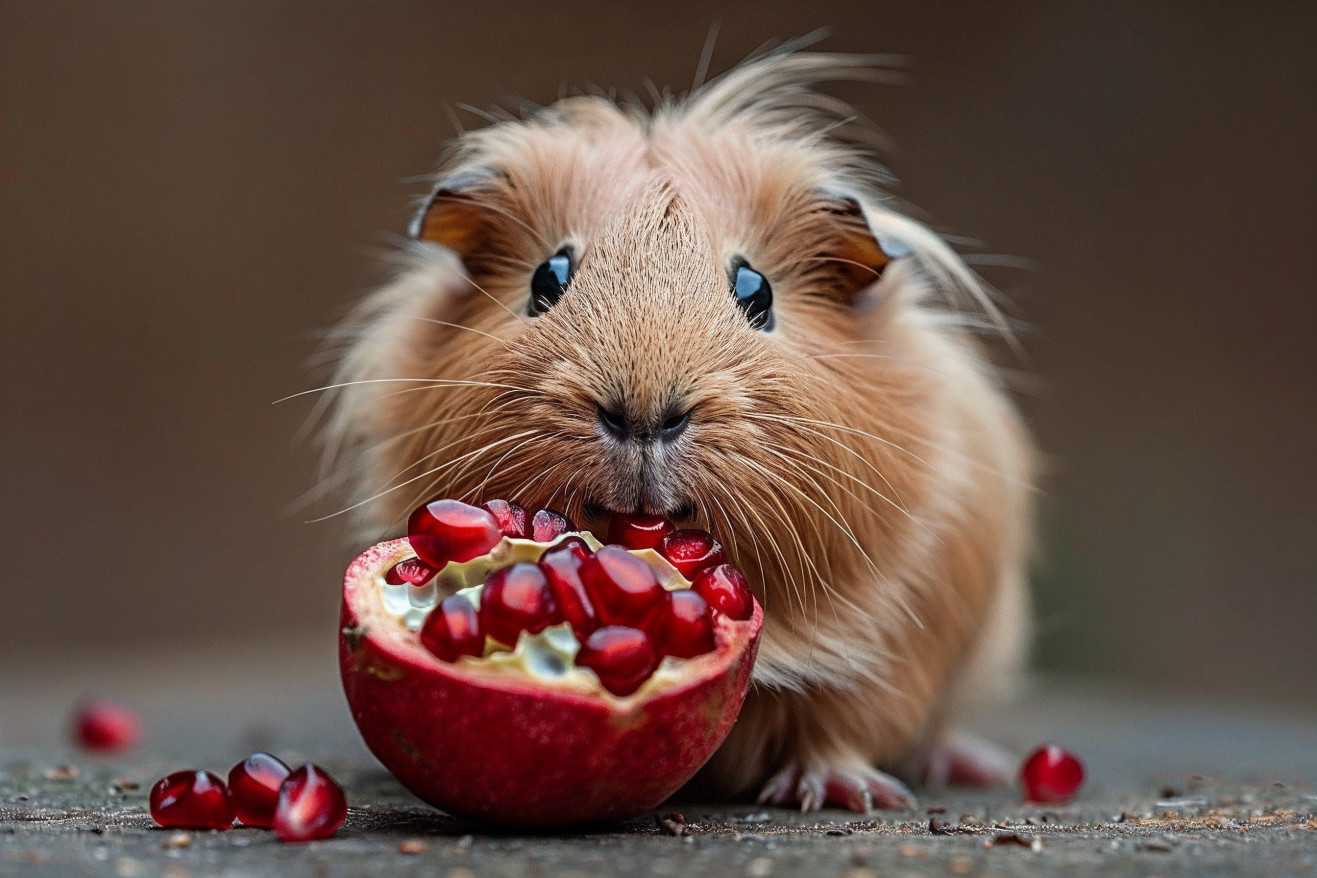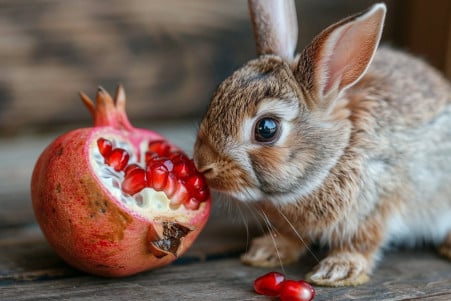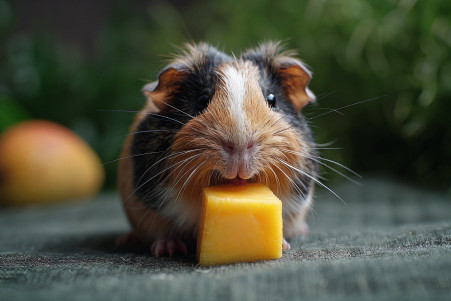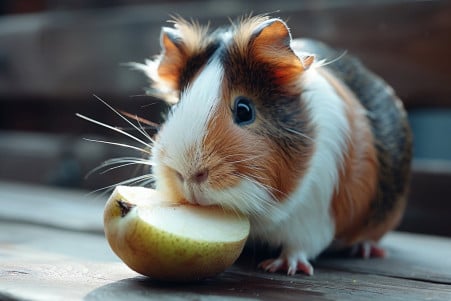Can Guinea Pigs Eat Pomegranate? Benefits and Safety Insights
12 June 2024 • Updated 10 June 2024

Guinea pigs can eat pomegranate, and there are several potential health benefits for your pet in this delicious fruit. Pomegranates are a great source of vitamin C, which can help boost your guinea pig's immune system, and they also contain antioxidants, which can help lower inflammation. However, because pomegranates are high in sugar, they should only be fed to your guinea pig as an occasional treat.
To learn more about this, let's look at what veterinary studies have found about the nutritional content of pomegranates and their impact on guinea pigs' diets and overall health. By reviewing the research, you can learn about the benefits and drawbacks so that you can decide whether or not you want to add pomegranate to your guinea pig's diet in a safe and healthy way.
Can guinea pigs eat pomegranate?
Nutritional Benefits of Pomegranate for Guinea Pigs
Pomegranates are nutritionally dense and can provide several health benefits to guinea pigs. As The Guinea Pig Forum points out, they are a great source of vitamin C, with 100g containing 10.2mg. This is important for guinea pigs, who can't synthesize their own vitamin C. Pomegranates also contain antioxidants that, according to Precisely Pets, can help with inflammation and support the immune system.
In addition to vitamin C and antioxidants, pomegranates have other nutrients that can be helpful. The same Guinea Pig Forum post says that they have a small amount of phosphorus, calcium, and good fats. Meanwhile, their fiber, which is about 4g per 100g, can help with digestion by moving food through the gut, according to Tiny Pet Planet.
Despite the many benefits, pomegranates can also pose some risks if guinea pigs eat too much of them. We'll cover these potential downsides in the next section.
Potential Risks and Drawbacks of Pomegranate
In addition to the many nutritional benefits that pomegranates can offer guinea pigs, there are also some potential risks and drawbacks to be aware of. According to Cavy Savvy, the biggest risk is the seeds of the pomegranate, which can be a choking hazard, especially for baby guinea pigs. The blog post suggests removing the seeds and feeding the juicy red arils to your guinea pig.
In addition to the choking hazard, pomegranates are high in sugar and acidic, which can cause digestive issues if consumed in excess. According to Precisely Pets, overeating pomegranate can lead to weight gain and other health problems in guinea pigs. Finally, the skin and white pith of the pomegranate are toxic to guinea pigs.
To make sure that pomegranate is a safe and healthy treat for your guinea pig, it’s important to know how to prepare it and how much to feed your pet, which we’ll cover in the next section.
How Much and How Often Can Guinea Pigs Have Pomegranate?
Most sources suggest that guinea pigs can have 1-2 arils or 1 teaspoon of pomegranate once a week. GuineaDad says that the amount can be adjusted based on the guinea pig's age, weight, and diet.
Tiny Pet Planet notes that pomegranate should be introduced slowly and that guinea pigs should be watched for signs of an adverse reaction like diarrhea or lack of energy. Pomegranate should be given as an occasional treat, not as a daily or regular part of their diet.
How to Safely Prepare and Serve Pomegranate
The main thing to be aware of when feeding guinea pigs pomegranate is the seeds, which can be a choking hazard, especially for younger guinea pigs, according to Cavy Savvy. The blog recommends removing the seeds and feeding the fleshy red arils to your guinea pig.
To prepare pomegranate for your guinea pig, you'll first need to remove the inedible outer skin and white pith. Then, remove the seeds from the red arils, so your guinea pig won't choke on them. As Guinea Pigs Journey notes, you can also mash or blend the arils to further reduce the choking hazard for younger guinea pigs.
No matter how you prepare the pomegranate, make sure to watch your guinea pig closely when you first introduce it to make sure they don't have any adverse reactions. As The Guinea Pig Forum points out, it's important to use moderation and take things slowly when feeding guinea pigs pomegranate or any other treat.
While pomegranate can be a healthy treat to give your guinea pig from time to time, you should always be on the lookout for signs of overeating, which we'll discuss in the next section.
Symptoms of Pomegranate Overconsumption and When to Go to the Vet
Guinea Pigs Journey notes that if you notice any digestive issues such as diarrhea, bloating, or a lack of appetite after giving your guinea pig pomegranate, you should stop feeding it to them. Precisely Pets also says that if you notice your guinea pig acting lethargic, dehydrated, or any other changes in behavior, this may be a sign of an adverse reaction.
If you notice any of these symptoms, stop giving your guinea pig pomegranate and contact your vet immediately. If your guinea pig is choking or has an intestinal blockage from the seeds, you should take them to the vet right away.
Conclusion: Pomegranates Should Be an Occasional Treat
As reported by Precisely Pets, guinea pigs can eat pomegranates, but they should be given in moderation as an occasional treat. Pomegranates are rich in antioxidants and vitamins, especially vitamin C, which is particularly important for guinea pigs since they cannot synthesize it on their own. The fiber in pomegranates can also help with digestion by moving food through the gut.
That said, pomegranates are high in sugar, and if eaten in large quantities, this can lead to weight gain, dental issues, and digestive problems in guinea pigs. GuineaDad suggests that guinea pigs should only be given one cup of fresh fruits and vegetables a day in addition to their regular hay and pellet diet.
Tiny Pet Planet warns that pomegranate seeds can also be a choking hazard, especially for younger guinea pigs, so it's important to prepare the fruit properly by removing the seeds.
It's also important to introduce pomegranate slowly and watch for any negative reactions, as noted by Tiny Pet Planet. If your guinea pig experiences diarrhea, bloating, or a lack of appetite, they may be having trouble digesting the pomegranate, and you should stop feeding it to them and contact your vet.


